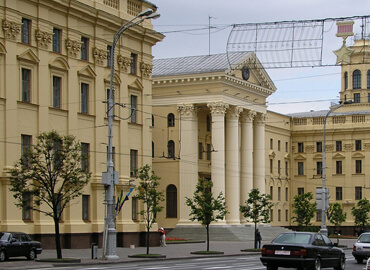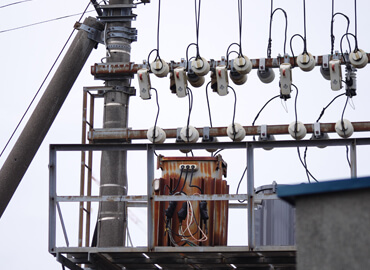A need for fast actions
The human rights situation in Belarus remains extremely tense and has developed into an unprecedented crisis, to which even the most dramatic episodes in the previous cycles of lawlessness and state violence in this country cannot compare. The government of Belarus has taken no steps in meeting the demands of protest participants, democratic opposition and civil society. On the contrary, in the last three weeks the severity of repression has dramatically intensified, reminiscent of the crackdown during the first days after the presidential election in August. During almost four months of the protests, around 30 thousand people have been arbitrarily detained; politically motivated criminal charges have been brought against more than a thousand individuals; 146 people have been included by Belarusian NGOs in the list of political prisoners as of 1 December; more than a thousand cases of torture and inhuman treatment have been documented, and several people were murdered by members of the law enforcement or their proxies. While pro-democracy groups and thousands of courageous citizens persist in their demands and continue coming out to the streets, the suffering of the people and the cost of the protest are growing.
Dramatic developments in Belarus make the role of the international community more important than ever. With the release in early November of the OSCE Moscow Mechanism report in respect of Belarus, we have the most comprehensive and detailed documentation of the current full-blown human rights crisis in this country, analysed within the framework of OSCE human dimension commitments and UN human rights standards. The report contains very clear and precise recommendations to the government of Belarus and the international community. A real impact of this important OSCE instrument on further developments fully depends on an effective follow-up to the report by various international actors, first and foremost by the invoking states.
The goals of stopping violence and ending impunity appear the most urgent. While Lukashenko is still in power, no investigation of state-sponsored violence and prosecution of the perpetrators of human rights crimes is possible in Belarus. In this context, two recommendations in the OSCE report stand out as the most important: «establishment of an independent international body for the in-depth investigation of human rights violations in the context of the presidential elections with the help of forensic experts» and «bringing perpetrators of torture and inhuman treatment among the Belarusian security forces and their responsible superiors to justice wherever possible».
Besides these recommendations in the OSCE Moscow Mechanism report, similar calls have been made by the Council of Europe and the European Parliament as well as by the Coordination Council of Belarusian opposition and the national democratic leader of Belarus Sviatlana Tsikhanouskaya. Most recently, calls for such steps to be taken immediately were strongly put forward by dozens of Belarusian and international civil society groups at a roundtable on a follow-up to the Moscow Mechanism report organized on 11 November by an OSCE-wide NGO network, the Civic Solidarity Platform, with participation of Ms. Tsikhanouskaya, the author of the OSCE report Dr. Wolfgang Benedek, the UN Special Rapporteur on the situation of human rights in Belarus Dr. Anaïs Marin, representatives of OSCE institutions, and diplomats of almost all states that had invoked the OSCE Moscow Mechanism in respect of Belarus.
Clearly, there is a growing consensusthat these two lines of work are the most urgent forthe international community to pursue in order to bring justice to victims and deter security forces in Belarus from committing new crimes. Certain elements of needed actions are pretty self-evident. For an effective international investigation, it is the importance of timely and professional documentation of torture and the obtaining of a proof of a linkage between crimes and their perpetrators as well as the establishment of a secure and well maintained depository of data where lawyers and NGOs working with torture cases could submit their documentation.
Likewise, for the prosecution of culprits at the international levelsuch actions are being actively discussed as the use of the universal jurisdiction mechanism in the states where it is embedded in the national justice system as well as requesting the International Criminal Court to investigate the situation of alleged crimes against humanity committed in Belarus.
However, no agreement has emerged yet on how exactly actions to pursue investigation and prosecution should be undertaken, by whom, under which umbrella, and in what sequence. While active discussions of these questions are underway in different corners, it may take a while for various actors, especially in inter-governmental bodies, to come to an agreement and make decisions. Time is of the vital importance: the slower decisions are taken and practical steps made, the more casualties are likely to be sustained on the streets and in prisons in Belarus.
International investigation body
Having the time factor in mind, a joint and speedy action by a group of like-minded states to establish an international investigation body to investigate human rights crimes committed in Belarus in the context of August 2020 elections and the ensuing protests appearsthe most expedient and effective way forward. Urgency is essential, as state violence and repression continue to increase in Belarus. The establishment of such a body may have a preventive effect on the human rights situation on the ground and weaken the regime’s key support base among law enforcement employees.
Naturally, concerned public inside and outside Belarus expectsthat leadership in this process will be taken by the 17 states that invoked the OSCE Moscow Mechanism. It would be proper not only from the point of view of their moral and political responsibility but also in practical terms of ensuring legitimacy of the process, its efficiency and speed. Like-minded states beyond the group of the Moscow Mechanism initiators should be welcome to join at any stage. The mere fact of a public announcement by a group of concerned states that they are taking the responsibility for the investigation and prosecution and are starting immediate practical steps to make this happen will encourage hundreds of thousands of Belarusiansfighting against oppression and deliver a deterring message to members ofthe security forces: «You do not have a chance to escape responsibility; we are going after you!»
Obviously, an attempt to create such a body by a decision of an inter-governmental organisation would take much longer. In the UN Human Rights Council, a motion to establish a commission on inquiry, similar to commissions on situations in other countries, would not guarantee a favourable result, given a likely opposition by some members of the Council. The same applies to the idea of an international mechanism to investigate the most serious crimes under international law committed that could in theory be established by the UN General Assembly, based on the model of a mechanism for Syria. In its turn, the OSCE has never established such types of independent bodies, and given the consensus mechanism of decision-making in the organisation, it is not feasible. Similar action taken by the Council of Europe alone is not possible because Belarus is not its member state. Finally, an investigation body created only by nongovernmental organisations would have much less weight and legitimacy. However, political and expert support from the UN, the OSCE and the CoE would be essential for upholding the body’s legitimacy since it will not be derived from an official mandate created by an inter-governmental organisation. Civilsociety would also make an important contribution to the work of the body.
After the concerned states take a joint decision to establish an international body, they should request inter-governmental organisations, including the OSCE, the UN, and the CoE, to provide their experts as seconded personnel who would work the states’ own experts, including forensic experts.
States could also designate a respected academic institution specialising in international human rightslaw and specifically in the issue of international human rights crimes to organise and maintain a depository of data. Such a neutral and professional depositary would collect findings from lawyers and NGOs working on the documentation and ensure high standards of quality.
The body’s overall objective would be to gather, analyse and preserve evidence to ensure that justice can be done.
The body’s mandate would include:
- collecting and storing documentation of human rights crimes that could be used in the future criminal justice procedures, be it at the national or international level;
- providing guidance and support to groups working on documentation to ensure high professional standard and quality of data collection;
- analysing collected information, making conclusions and presenting them in the form of reports and statements.
The structure of the body could include:
- A data depository (an evidence collection centre) based in a respected and neutral academic institution which has strong expertise in international human rights law and the capacity to store evidence in a safe manner to make it available on request to judicial institutions;
- An expert taskforce (a secretariat) carrying out the day-to-day work on collecting and analysing evidence, establishing links, etc., to which the initiating states and inter-governmental organisations like the CoE (CPT), OSCE (ODIHR) or UN OHCHR (HRC special procedures) would provide experts as seconded personnel;
- An expert commission (panel), composed of several high-profile, respected international experts such as former ICC and ECtHR judges, former members of the international tribunals, former members of the UN treaty bodies (Human Rights Committee, Committee against Torture, etc.) and mandate holders of the relevant UN special procedures (e.g., Special Rapporteur on torture, Working Group on enforced and involuntary disappearances, etc.), and responsible for formulating key findings and conclusions, issuing reports and making public statements, etc.;
- An advisory group composed of representatives of well-known and respected international and Belarusian NGOs.
The body would need to work closely with Belarusian and international NGOs, forensic experts, and lawyers working to collect data, including evidence of crimes and linkages of perpetrators with crimes. Therefore, the body would need to have a representation on the ground to work directly with the documenting NGOs and victims, including in Belarus and countries where victims of abuse have fled to (Lithuania, Poland, etc.). An inclusive approach should ensure that anybody who wants to contribute to the work of the investigative body should be able to do so.
In order to preserve the integrity of the investigation body and to ensure impartiality and credibility of its findings, it should not be drawn into the political process, but rather be considered a professional tool to serve the interest of ensuring accountability and preventing impunity. Therefore, the group of initiating states, after taking the decision on its creation and making necessary arrangements for its work in terms of appointing an academic institution to host the data depository, inviting experts, hiring personnel, providing resources, etc., should abstain from influencing its work but commit to follow-up upon its findings and conclusions both at the national level and level of inter-governmental organisations.
All these lines of work, including the maintenance of the data depositary and the work of experts, would require material resources. Funding for the investigation body could come from the European Union and concerned states.
In addition to this international mechanism whose work may extend for several years, a separate parliamentary investigation could be undertaken, e.g., under the auspices of the OSCE Parliamentary Assembly, similarly to the one performed in the case of Osh events in Kyrgyzstan in 2010. The Parliamentary Assembly of the Council of Europe and the European Parliament / Euronest could also be part of this process.
Using international justice mechanisms to hold the perpetrators accountable
States, inter-governmental organisations, and NGOs should cooperate to use international and national legal mechanisms to prosecute perpetrators of international human rights crimes in Belarus and hold them accountable. For this, two main avenues could be used.
First, it is a request to the International Criminal Court (ICC) to open an investigation of the situation in Belarus with a view of prosecuting perpetrators of crimes. Given that Belarus is not a state party to the ICC, two options are in principle available to ensure that jurisdiction of the ICC extends to these crimes.
A more immediate one, before the transit of power in Belarus, would require identifying human rights crimes with multiple elements, starting on the territory of Belarus (which is a non-party to the ICC) but completing on the territory of another country (a state party, with the ICC jurisdiction extending to its territory) by virtue of victims crossing the border to this state through expulsion, deportation, other coercive acts, or preventing individuals from returning to their own country. This would make the crime fall within the parameters of Article 12(2)(a) of the Statute. A precedent exists when the ICC took a decision in 2018 that it has jurisdiction over the alleged deportation of members of the Rohingya people from Myanmar to Bangladesh.
Another possibility exists in a longer-term perspective when after a transit of power, a new government of Belarus would lodge a declaration under Article 12.3 of the Rome Statute, extending the ICC’s jurisdiction over alleged crimes committed on itsterritory in a certain period of time. This would be similar to what the new government of Ukraine did in April 2014 in respect of alleged crimes committed under the government of Yanukovich from 21 November 2013 to 22 February 2014. National democratic leader of Belarus Sviatlana Tsikhanouskaya has already announced that an interim government would take this step immediately after coming to power. It is unlikely that such a declaration signed by Sviatlana Tsikhanovskaya before a transit of power would have legal force.
Opening an ICC investigation before a transit of power would be preferable as it may help speed up the termination of repressions.
If a case for a human rights crime with multiple elements can be identified, there are two ways to bring a request to the ICC: file a communication directly to the ICC Prosecutor and ask her to investigate, or submit a referral by a state party (or a group of state parties) under Article 14 of the Rome Statute. The latter option would carry more weight and can potentially speed up things considerably because a preliminary examination, which is the most time-consuming phase of the ICC proceedings, might be skipped and the process would go directly to the investigation phase. This can potentially mean that the arrest warrants would be issued in short terms. Opening a criminal investigation by the ICC against Lukashenko and the heads of security agencies could be a potential game-changer.
The second main direction of work to bring perpetrators to justice is to build universal jurisdiction cases in different European countries that have this mechanism embedded in their national justice systems and where victims of human rights crimes have fled to (it is very unlikely that any of the perpetrators would travel to these countries in the near future). Already ongoing efforts in this direction should be supported and funding for them should be allocated, especially given that specialised units in the national justice systems are relatively small and overwhelmed with the existing caseload.
Both legal tools, the ICC and the universal jurisdiction, should be applied in parallel.
The same group of like-minded states that would establish an international investigation body, could also take action on the prosecution of culprits, using data from the investigation. These would include opening criminal proceedings on the basis of universal jurisdiction and making state-party referrals to the ICC, asking for the opening of investigation and prosecution.
Finally, collected evidence, including linkage proof, could be used by these states for the inclusion of the culprits in the individual sanctions lists, either at the level of the EU or the national level. Those states which have adopted their own analogues of the Magnitsky law, could use it for the application of national sanctions against the perpetrators.
Legitimacy of these joint actions by a group of like-minded states could be derived from several sources. First, it is the responsibility of the states that invoked the OSCE Moscow Mechanism to take concrete and effective follow-up steps after the report was released. Secondly, state parties to the International Convention against Torture and the International Convention for the Protection of All Persons from Enforced Disappearance have the obligation to hold perpetrators of international human rights crimes accountable wherever they are. This give states the grounds for the use of the universal jurisdiction mechanism to pursue the culprits from security forces in Belarus. Finally, the states which ratified the Rome Statute have the authority to refer situations of alleged crimes against humanity to the ICC.
We would like to reiterate that time is of key essence. We realise that negotiations on joint actions for investigation and prosecution among 17 states that invoked the Moscow Mechanism may take precious time. We hope that a smaller group of states from among these 17 could take the initiative and lead the process of taking decisions and engaging with others, and the others would join soon.
It is high time to move quickly to the implementation of the key recommendations in the OSCE report to ensure that the bloodshed in the middle of Europe stops as soon as possible and justice prevails. Negotiations on the establishment of an international investigation body and on the measures for effective prosecution need to start without delay.
International Strategic Action Network for Security (iSANS) is an international expert initiative established in 2018 and aimed at detecting, analysing and countering hybrid threats against democracy, rule of law and sovereignty of states in Western, Central and Eastern Europe and Eurasia. Experts from both sides of the Atlantic joined forces in iSANS to strengthen the resilience of democratic project on all levels, including general public, civil society and the media, academic and expert communities, national governments and international organisations. The initiative’s priority is to defend international legal framework and democratic order against purposeful attempts to undermine, compartmentalise and destroy it by states and political forces disrespectful of universal democratic and human rights values. iSANS collaborates with 7 the media in publicising its findings and reaches out to national and international policy makers with practical recommendations on actions to be taken. For more information, see isans.org.
The Civic Solidarity Platform is a network of independent civic groupsfrom acrossthe OSCE region, bringing together non-governmental organizations, activists and experts committed to improving the situation with human rights, rule of law, and democratic institutions in Europe, Eurasia and North America. Its aim is to serve as a conduit through which civic activists can build alliances, strengthen mutual support and solidarity, and improve their influence on national and international human rights policy. For more information, please visit civicsolidarity.org.











